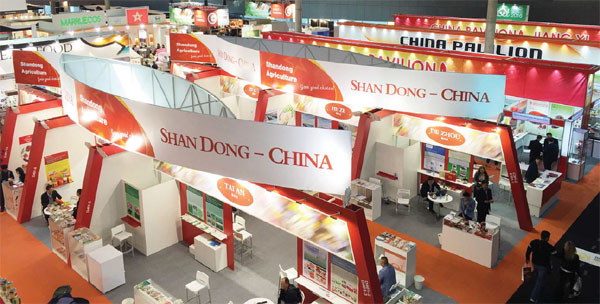Spain food fest gets full helping of Chinese
Record numbers of exhibitors and buyers show up for Barcelona biennale
Barcelona's biennale international food and drinks expo, Alimentaria, saw a record number of Chinese exhibitors this year, forming the second-largest foreign contingent behind Italy.
The event, which was held from April 25 to April 28, is the sector's third-largest international trade show.
|
More than 100 Chinese food and agricultural companies take part in the Alimentaria Exhibition in Barcelona this year. Photos by Li Jing / China Daily |
This year, it featured more than 1,000 foreign companies, 25 percent of the total exhibitors. Among them, 123 were from China, a 5 percent increase on 2014.
Most Chinese exhibitors were at international pavilions in a new section introduced this year to complement the show's traditional restaurant, wine, meat and dairy products sectors.
Taian Optimum Foods Technology Co, a agrifood business from the eastern province of Shandong that exports frozen and fresh organic vegetables, was among the firms making their debut at the expo.
Li Hu, its chairman, says the big draw was that the Spanish market is open to overseas companies and that there are no specific restrictions on food industry imports.
According to data from the Spanish Food and Drink Industry Federation, Spain imported food and drink worth 18 billion euros ($20.2 billion) in 2014, with France the main supplier, accounting for 16.8 percent. China was the 10th-largest supplier.
Li visited supermarkets and major food markets in Barcelona and says he found that the availability of Chinese agrifood products is small.
"The market potential is big for Chinese companies. Their food products will be competitive for their low price and good quality," he says.
He cites garlic as an example, saying the average price in Spain is 8 euros a kilogram, while in China it is the equivalent of 1.30 euros. "There will be margins, even after the import process and transportation."
Zhang Guojing is a representative of Green Farmer Food Group, a company producing Chinese seasonings in Hebei province. He says Spain has a large demand for seasonings because of its culinary culture.
"We have some customers here, and we expect the fair to help us enter other European regions," he says.
"In Spain, the trade business is developed, and the country also has close business connections with other European nations. We're looking to tapping the market and expanding our business."
Alejandro Alcon Esparte, a chef who owns four restaurants in Barcelona, says Chinese food products are becoming popular in his country as people seek diversity. "Customers from Northern Europe, in particular, are interested in exotic Asian food," he adds.
Some exhibitors at the show also say they see Spain as a gateway to Latin America.
Sun Lu, president of Medallion, a company that makes fruit cups and jelly, says: "It's the first time for us to exhibit at the fair. Our target market is Latin America, although there weren't many buyers from there, not as many as I expected and fewer than at fairs in the United States."
In addition to the exhibitors, a record 62 Chinese buyers also traveled to this year's event. The group was invited as part of a Alimentaria program that invites 800 key buyers from 78 countries and was made up of importers and major operators involved in distribution and the hotel, restaurant and cafe sector.
J. Antoni Valls, managing director of Alimentaria Exhibitions, says the fair began to invite Chinese buyers four years ago.
He says China is a key market for the Spanish food and drinks industry when it comes to promoting and diversifying exports because of its "industry volume and double-digit growth over the past 10 years".
"Meat, wine and olive oil are the main products China imports from Spain," he adds.
The food and drink industry in Spain is highly internationalized. Last year, 16,575 of the total 132,277 Spanish exporters shipped agrifood between January and November, according to the Spanish Institute for Foreign Trade.
Some 55 percent of food companies with a foreign presence export on a regular basis and have exported for at least four consecutive years, the institute says.
Spain's exports of food and drink products reached 37.5 billion euros between January and November, up 8.34 percent on the same period in 2014. The European Union is the main destination of its agrifood exports. However, sales saw the biggest increase in non-EU markets, including a 61 percent increase in China, the data show.
Mauricio Garcia Quevedo, managing director of the Spanish Federation of Food and Drinks Industries, says the pace of exports of Spanish food and drink products allows them to forecast that in 2020 foreign sales will represent a large proportion of the total production output of the industry, taking Spain from Europe's sixth-largest export economy up to fourth in the next four years.
lijing2009@chinadaily.com.cn



















